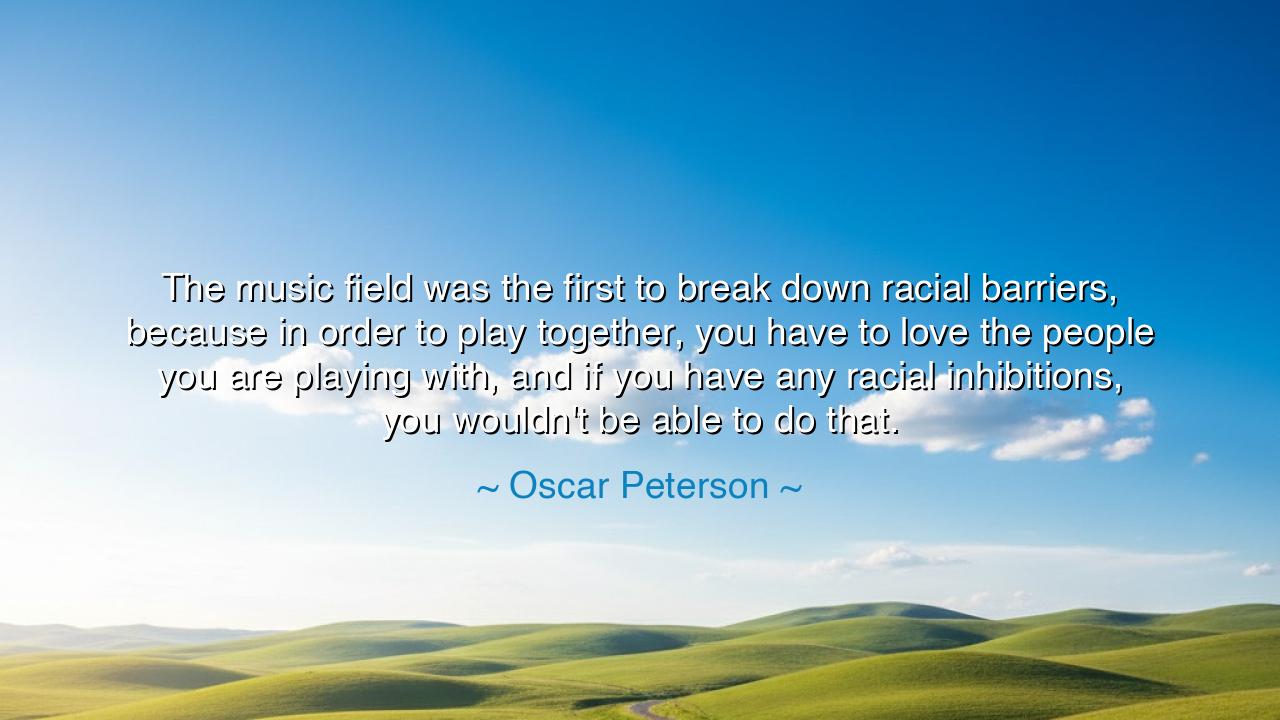
The music field was the first to break down racial barriers
The music field was the first to break down racial barriers, because in order to play together, you have to love the people you are playing with, and if you have any racial inhibitions, you wouldn't be able to do that.






Hear the profound words of Oscar Peterson, the giant of jazz whose fingers spoke truth upon the keys: “The music field was the first to break down racial barriers, because in order to play together, you have to love the people you are playing with, and if you have any racial inhibitions, you wouldn't be able to do that.” These words are not only about notes and melodies—they are about the power of art to pierce through prejudice and to heal divisions that laws and politics often fail to mend. In his voice is the eternal truth: that where there is music, there must also be love, and where love enters, hatred is banished.
From the beginning of time, music has been the language of unity. The ancients sang hymns together in temples and fields, dissolving differences in the harmony of their voices. The warrior’s march, the peasant’s harvest song, the sailor’s chant—all were ways of binding souls into one rhythm. Oscar Peterson’s insight carries this same wisdom forward: in the act of creating music, the players must surrender prejudice, for no man can truly share rhythm and melody with another whom he despises.
Consider the story of jazz itself, born in the crucible of New Orleans. In that city, cultures clashed and mingled—African, European, Caribbean—and out of their mingling came a new sound. Black and white musicians played side by side, often in defiance of the laws and customs that tried to keep them apart. On the bandstand, color meant nothing; what mattered was the groove, the timing, the shared spirit of improvisation. It was here that racial barriers began to weaken, not because society willed it, but because the music demanded it.
Oscar Peterson himself lived this truth. A Black Canadian pianist of extraordinary skill, he played with musicians from every background, earning respect not by demanding it, but by sharing it. In his collaborations with artists like Benny Goodman, Ella Fitzgerald, and countless others, he embodied his own words: to truly play together, one must love the people one plays with. And in that love, in that shared respect for the art, the poisonous walls of prejudice could not stand.
History offers further testimony. Think of Louis Armstrong, who brought his horn into concert halls that once would have barred him for the color of his skin. Yet when he played, the audience forgot the divisions taught to them by society; they heard only joy, only humanity. Or consider Marian Anderson, who in 1939 sang on the steps of the Lincoln Memorial after being denied entry into Constitution Hall because of her race. In her voice, the truth was undeniable: music itself proclaims equality, and in its sound, the barriers of hate begin to crumble.
The meaning of Peterson’s words is clear: music is not only art—it is revolution. It is the place where hearts meet, where hands and breath and strings and keys merge into one creation. And because it demands unity of spirit, it shatters the false divisions that men build between themselves. What politics and laws struggle to enforce, music often achieves effortlessly—because it flows not from compulsion, but from love.
The lesson for us is timeless: if you would break down barriers, create together. Whether through music, work, conversation, or service, enter into partnership with those different from you, and the walls will fall. For you cannot create truly with one you hate—you must first see their humanity, honor their contribution, and love the part of yourself that finds harmony with them.
Practical action lies before you: seek out the “other,” the one whom prejudice tells you to avoid, and join with them in some shared act of creation—whether in music, art, or simple service. In the act of working together, love will grow, and where love grows, hate cannot remain. Let Peterson’s words guide you: break barriers not with argument alone, but with harmony.
So let it be remembered: “The music field was the first to break down racial barriers, because to play together, you must love the people you play with.” Carry this wisdom forward. Let your life be a song of unity, a melody that binds, a rhythm that heals. And perhaps, when generations look back, they will say that you, too, helped to turn division into harmony, and hatred into love.






AAdministratorAdministrator
Welcome, honored guests. Please leave a comment, we will respond soon